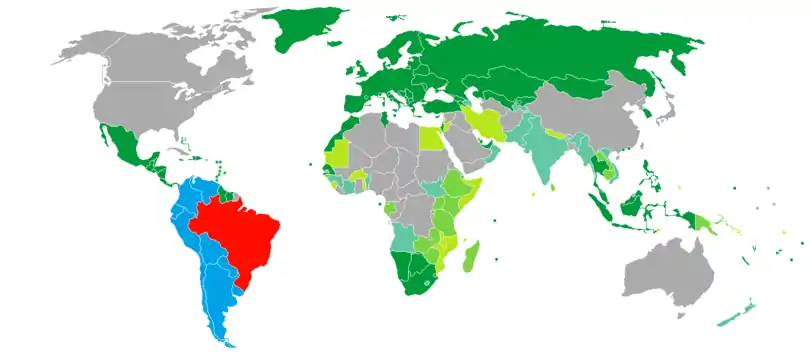Brazilian nationality law
Brazilian nationality law is based on both the principles of jus soli and of jus sanguinis. As a general rule, any person born in Brazil acquires Brazilian nationality at birth, irrespective of the status of parents. It may also be acquired by children born abroad of a Brazilian parent or by naturalization.
 |
|---|
| This article is part of a series on the politics and government of Brazil |
|
|
The rules on Brazilian nationality are determined generally by article 12 of the constitution and detailed by migration law and regulations.[1][2][3][4]
At birth
Any person born in Brazil acquires Brazilian nationality at birth, with the sole exception of children of parents in the service of a foreign government, such as a foreign diplomats.[1]
A person born outside Brazil of a Brazilian parent also acquires Brazilian nationality at birth if:[1]
- The Brazilian parent is in the service of the Brazilian government; or
- The person is registered with a Brazilian consular office; or
- The person later moves to Brazil and confirms one's nationality before a federal judge.
Between 1994 and 2007, registration with a Brazilian consular office did not confer Brazilian nationality. In September 2007, a constitutional amendment reinstituted consular registration as a means of acquiring Brazilian nationality.[1]
By naturalization
Requirements
Foreigners may apply for Brazilian nationality if they meet the following criteria:[2][3][4]
- Four years of permanent residency in Brazil;
- Ability to communicate in Portuguese; and
- No prior criminal conviction, in Brazil or in the country of origin, unless rehabilitated.
The residency requirement may be reduced in certain circumstances:[2][3][4]
- Only two years of residency are required for those who have provided "relevant services" to the country, for those with notable "professional, scientific or artistic ability", or for stateless people;
- Only one year of residency is required for those who have a Brazilian spouse or child (not including minors provisionally naturalized), or for nationals of Portuguese-speaking countries;
- No residency period is required for those married to a Brazilian diplomat for more than five years, or for those who worked for more than 10 years in a Brazilian diplomatic mission.
The ability to communicate in Portuguese may be attested by one of various certificates, such as with the CELPE-Bras exam, completion of a Portuguese language course for immigrants in a Brazilian university, or completion of elementary, secondary or higher education in Brazil or in another Portuguese-speaking country.[4] Those who have lived in Brazil for more than 15 years or who are nationals of Portuguese-speaking countries are not required to attest their Portuguese language ability.[1][2][3][4]
Minors who moved to Brazil under 10 years of age may be granted a provisional naturalization, and within two years after reaching the age of majority they may request a permanent naturalization. At that time they must satisfy the requirement of no criminal conviction or of rehabilitation, but they are not required to attest their Portuguese language ability.[2][3][4]
Process
The application for naturalization is filed online.[5] There is no fee for the application itself,[6] although there may be fees to obtain some of the required documents. The initial processing is done by the Federal Police, which collects the applicant's fingerprints and may request a recorded interview or additional documents.[4] The process is then sent to the Ministry of Justice and Public Security, which may also request additional documents, and finally publishes its decision in the Official Journal, available online.[5] If approved, a copy of this decision is sufficient proof of naturalization to obtain a Brazilian identity document or passport.[7][8] There is no ceremony, and since 21 November 2017 certificates of naturalization are not issued.[6]
Since 10 May 2016, Brazil does not require naturalized citizens to renounce their previous nationality.[9][10][3]
Dual nationality and loss of Brazilian nationality
According to the Brazilian constitution, Brazilian citizens who acquire another nationality may lose Brazilian nationality. However, since 1994 a constitutional amendment allows two exceptions where Brazilians may maintain Brazilian nationality while acquiring another one. The first exception is in the case of recognition of "originary nationality" by foreign law,[1] meaning where the other nationality is acquired by origin (by birth or descent, as opposed to naturalization).[11] The second exception is in case the other country requires naturalization for the person to remain residing or to exercise civil rights there.[1]
Although the government has the power to revoke Brazilian nationality of those who voluntarily naturalized in another country and did not satisfy one of the exceptions, it tends to apply these exceptions very broadly, and in practice it only revokes Brazilian nationality if the person formally requests so, or very rarely in exceptional circumstances.[12][13] For example, in 2013 the Brazilian government revoked the nationality of a Brazilian citizen who had naturalized in the United States, to extradite her back to that country (the Brazilian constitution does not allow extradition of its own citizens by birth). The decision was confirmed by the Supreme Federal Court in 2017, and she was extradited in 2018.[14]
Those who lost Brazilian nationality due to naturalization in another country may apply for its reacquisition on the condition that they will renounce the other nationality.[12] After Brazilian nationality is reacquired, the applicants have 18 months to show proof of renunciation of the other nationality. The process is done in this order to prevent statelessness.[4]
Naturalized Brazilians are allowed to also keep their previous nationality.[9][10][3] They may lose Brazilian nationality if convicted of activity considered "harmful to the national interest".[1][2][3]
Brazilian citizens who also have another nationality are allowed to enter and leave Brazil with the passport of the other country. In this case, the Brazilian government recommends that they also present a document attesting Brazilian nationality, such as a Brazilian identity card or an expired Brazilian passport, to avoid the usual limitations on the period of stay of foreign visitors.[15] Brazil only issues visas to dual citizens in exceptional circumstances, such as for those who work in foreign government jobs that prohibit the use of a Brazilian passport.[16]
Rights and obligations
Military service
Male Brazilian citizens have a 12-month military service obligation, unless the citizen has a disqualifying physical or psychological condition, or the citizen does not wish to serve and the military finds enough volunteers to support its needs. Therefore, although registering for the military is mandatory, about 95% of those who register receive an exemption.[17] Male citizens between 18 and 45 years of age are required to present a military registration certificate when applying for a Brazilian passport.[8]
Voting
Voting in Brazil is mandatory for citizens between 18 and 70 years of age. Those who do not vote in an election and do not later present an acceptable justification (such as being away from their voting location at the time) must pay a fine of 3.51 BRL.[18][19] Citizens between 18 and 70 years of age are required to present proof of voting compliance (by having voted, justified absence or paid the fine) when applying for a Brazilian passport.[8]
Naturalized citizens
The constitution makes a few distinctions between Brazilian citizens by birth and by naturalization. Only citizens by birth may become President or Vice President of Brazil, President of the Chamber of Deputies, President of the Senate, members of the Supreme Federal Court, diplomats, officers of the Armed Forces, Minister of Defence, or certain members of the Council of the Republic. Naturalized citizens, but not citizens by birth, may be extradited (only for a common crime committed before naturalization or for drug trafficking), and may lose Brazilian nationality if convicted of activity considered "harmful to the national interest". The constitution also restricts the ownership and management of media companies to citizens by birth or who have been naturalized for more than 10 years. Other than the cases mentioned in the constitution, no law may make distinctions between citizens by birth and by naturalization.[1]
Many naturalized citizens have been elected to municipal offices, including the mayor of a state capital.[20]
Portuguese citizens
Due to a treaty, citizens of Portugal permanently residing in Brazil may request equal civil rights, and after three years of residence also political rights, such as voting and being elected, as if they were naturalized citizens of Brazil. In this case, exercising political rights in Brazil under the treaty results in the suspension of their equivalent rights in Portugal, even though they remain Portuguese citizens.[1][21][4][22]
Unlike naturalization, the equality of rights under this treaty does not include the right to a Brazilian passport.[8]
Visa-free travel

Visa requirements for Brazilian citizens are administrative entry restrictions by the authorities of other states placed on citizens of Brazil. As of 7 January 2019, Brazilian citizens had visa-free or visa on arrival access to 171 countries and territories, ranking the Brazilian passport 17th in terms of travel freedom according to the Henley visa restrictions index.[23]
See also
References
- Constitution of the Federative Republic of Brazil of 1988, Government of Brazil (in Portuguese).
- Law no. 13.445, of 24 May 2017, Government of Brazil (in Portuguese).
- Decree no. 9.199, of 20 November 2017, Government of Brazil (in Portuguese).
- Ruling no. 623, of 13 November 2020, Ministry of Justice of Brazil (in Portuguese).
- Naturalizing as Brazilian, Government of Brazil (in Portuguese).
- Frequent questions, Ministry of Justice and Public Security of Brazil (in Portuguese).
- First issuance of the identity card, Transit Department of Rio de Janeiro (in Portuguese).
- Obtaining a passport, Government of Brazil (in Portuguese).
- ACNUR: New decree facilitates naturalization of foreigners in Brazil and fights statelessness, United Nations in Brazil, 20 May 2016 (in Portuguese).
- Decree no. 86.715, of 10 December 1981, Government of Brazil (in Portuguese).
- Ruling number 172 of the Ministry of Justice, of 4 August 1995, 26th Notary Office of São Paulo (in Portuguese).
- Loss of nationality, Ministry of External Relations of Brazil (in Portuguese).
- A Brazilian may lose original nationality while becoming a citizen of another country, Gazeta Brazilian News, 20 April 2017 (in Portuguese).
- Government extradites Brazilian that lost citizenship, accused of homicide in the US, Consultor Jurídico, 18 January 2018 (in Portuguese).
- Brazilians with a passport of another country, Federal Police of Brazil, 6 March 2019. (in Portuguese)
- Visitor visa, Consulate General of Brazil in Miami.
- What are the obstacles to 'conscientious objection' to military registration?, Nexo, 16 June 2017 (in Portuguese).
- Voting justification, Supreme Electoral Court of Brazil (in Portuguese).
- Answers to doubts from voters, Regional Electoral Court of São Paulo (in Portuguese).
- Almost 200 foreign candidates are elected in the country, Globo, 20 October 2012 (in Portuguese).
- Decree no. 3.927, of 19 September 2001, Government of Brazil (in Portuguese).
- Equality of rights, Consulate General of Portugal in São Paulo (in Portuguese).
- "Global Ranking - Visa Restriction Index 2019" (PDF). Henley & Partners. Retrieved 12 January 2019.
